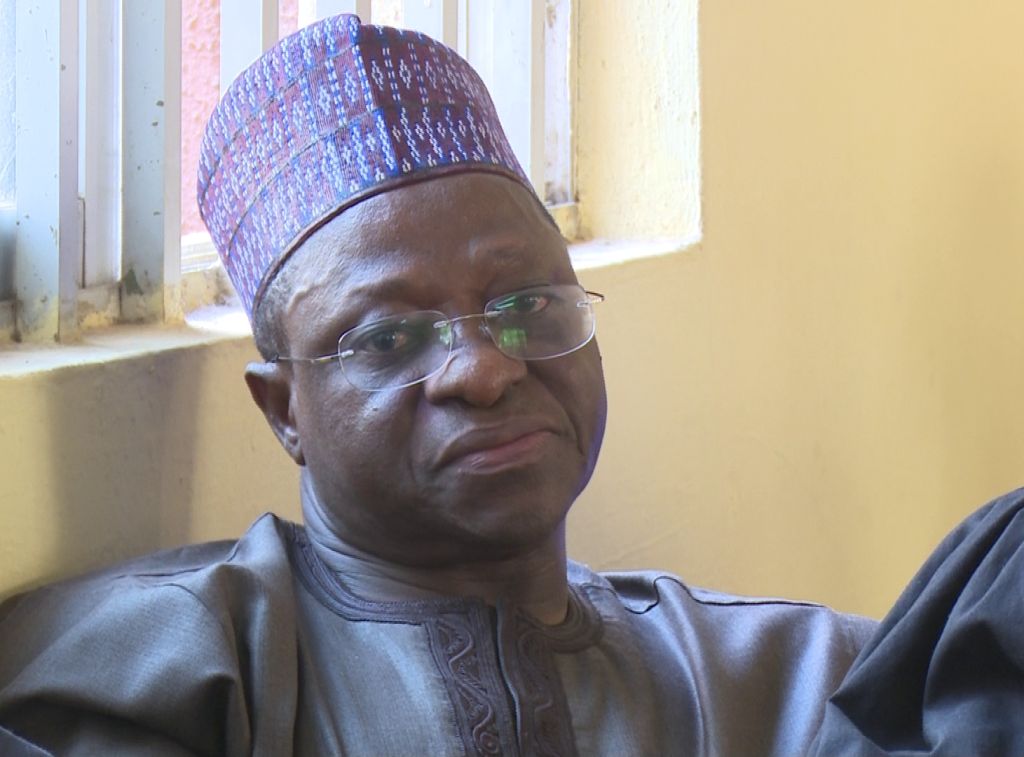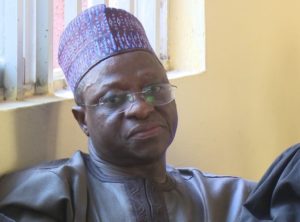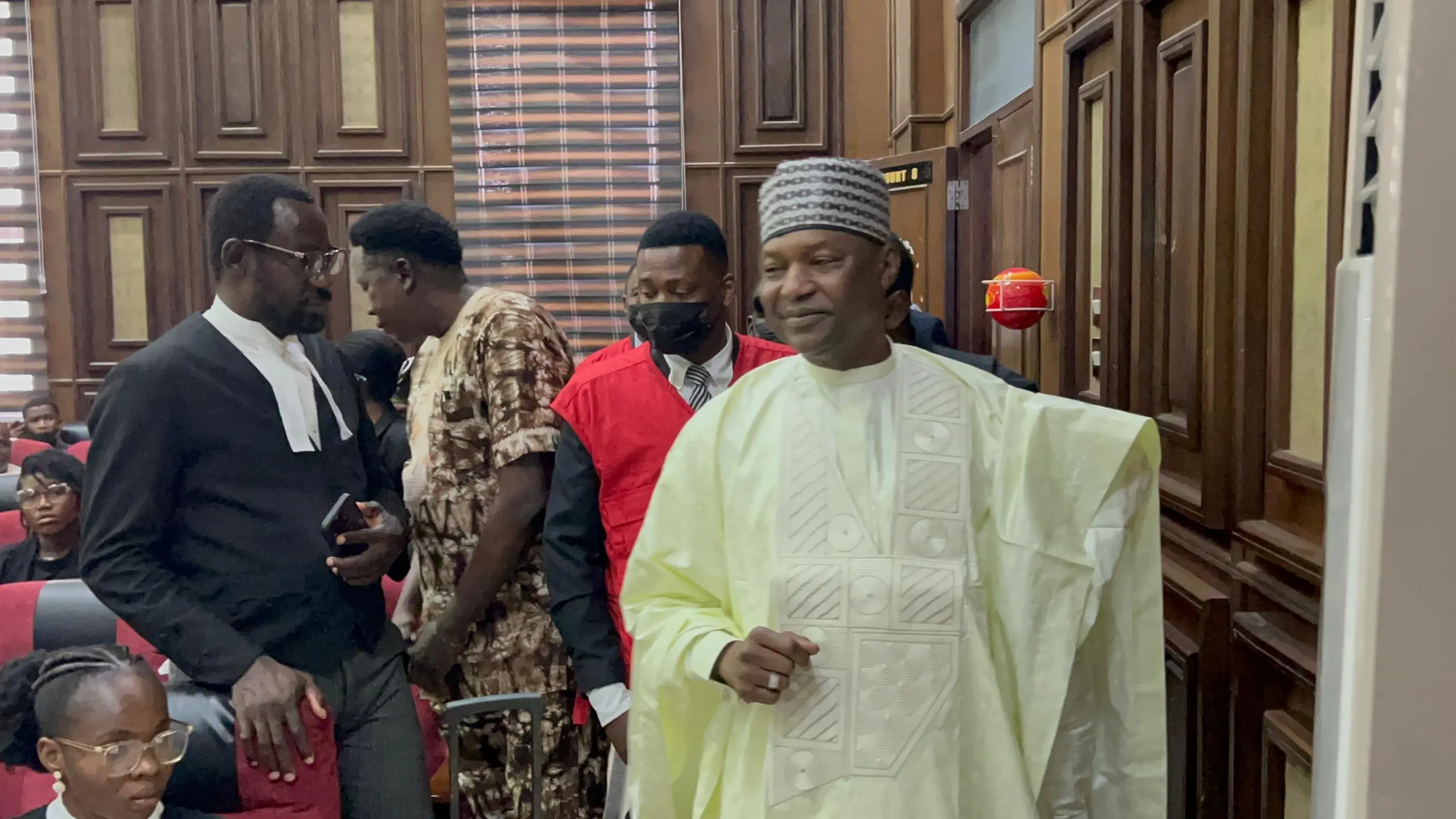General
Dariye Loses Another Bid to Frustrate N1.2b Fraud Trial


By Dipo Olowookere
Former Plateau State Governor, Mr Joshua Dariye, has again lost his bid to scuttle his N1.162 billion fraud trial, preferred against him by the Economic and Financial Crimes Commission (EFCC).
Justice Adebukola Banjoko of the Federal Capital Territory (FCT) High Court, Gudu, Abuja, on March 6, 2017 threw out his motion seeking for his lordship to be disqualified from the trial.
Mr Dariye, who is facing a 23-count charge for allegedly diverting the state’s Ecological Fund to private companies including Ebenezer Retnan Ventures and Pinnacle Communications Limited, had in January lost in a similar bid, having applied to Justice U.I. Bello, the Chief Judge, CJ of the FCT High Court, accusing the trial judge of “manifest and undisguised bias”, and seeking for the case file to be transferred to another judge.
The CJ threw out the application and ordered Mr Dariye to go and continue with his trial before the judge as his allegation of bias was “baseless”.
At the time Mr Dariye sent his letter to the CJ, dated December 13, 2016 his defence counsel, G.S. Pwul, SAN, also brought two motions to the court, one of which was the one asking the trial judge to “disqualify” his lordship from the case.
He had also applied to the court, seeking for the recall of two principal witnesses, Musa Sunday, an EFCC operative who was cross-examined by both the prosecution and defence on January 25, 2016 and Peter Clark, a retired detective constable with the United Kingdom, UK Metropolitan Police, who was cross-examined by both counsels on May 9, 2016.
At the last sitting on March 2, 2017 Pwul, while arguing the applications, contended that it was necessary to recall the witnesses “in relation to new evidence”.
Citing exhibits D6 – D34 as the reasons for the recall, he further argued that there was need to further cross-examine Sunday as regards transactions between the Plateau State government and Pinnacle Communications Limited. He had also urged the court to summon Clark “in relation to his evidence and investigation activities carried out in the United Kingdom and to confront him with new evidence”.
Prosecution counsel, Adeniyi Adebisi, in his argument contended that the defence was provided with the list of all the witnesses in the proof of evidence, which included the names of the witnesses, which it wanted to bring to the court.
He added that “the defence knew in advance the witnesses to be called by the prosecution and so had adequate time and opportunity to review their statements and all evidence referred to were in existence and available long before Musa Sunday and Peter Clark testified before the court”.
Adebisi further argued that: “Dariye was present at all proceedings and well represented by his counsel who thoroughly cross-examined the two witnesses.” He reminded the court that Clark had retired and during the trial “the defence was never stampeded and the court didn’t force the counsel to conclude his cross-examination”.
He surmised that: “The applications are a ploy to delay the case and the Supreme Court has given directive for expeditious hearing”. He urged the court to dismiss the applications “with substantial cost”.
Justice Banjoko in ruling on the motion seeking for his lordship to be disqualified from the case, said: “I have no interest whatsoever in this case and I have so far presided over the case without fear or favour, and in line with my oath of office and so the motion lacks merit and is accordingly dismissed.”
The trial judge ruling on the second motion, noted that “the defence has called 16 witnesses and is now seeking to reopen prosecution’s case when defence is still going on”, and “the prosecution has already closed its case”.
The trial judge citing several authorities noted that while a recall by a party involved in a case is not out of order, “a recall is permitted only by a trial judge” and based on two facts that the party seeking a recall brings to the court “good enough facts as well as questions he intends to ask the witness which in this instance the defence has not done”.
While dismissing the application seeking for recall of Clark, the trial judge ruled that: “I have carefully considered all the authorities and submissions of counsels and found that Peter Clark the prosecution witness nine, PW9, resides in a territorial jurisdiction outside of Nigeria and in his oral testimony he stated that he retired on 9 March 2015, and came to Nigeria on his own freewill to see to the end of an investigation he started and the court can see that the witness was extensively cross-examined by the defence and the defence was not curtailed or prevented and so had maximum advantage to cross-examine him.”
The trial judge noted that Clark was a master of his own time and there was nothing to hold that he still resides in the UK since his retirement and moreover, he was not a “compellable witness”.
“The application is hereby denied and accordingly dismissed,” the trial judge held.
Justice Banjoko while adjourning to March 16, 2017 “for defence to continue”, however acceded to the request of the defence to recall Sunday for “further cross-examination in the interest of justice” and because he still resides in the “territorial jurisdiction of Nigeria”.
General
NISO Attributes Electricity Woes to Inadequate Gas Supply

By Adedapo Adesanya
The Nigerian Independent System Operator (NISO) has attributed the poor power supply facing a considerable number of Nigerians to inadequate gas supply to thermal power plants.
Business Post reports that epileptic power supply has plagued consumers in Lagos, Oyo, Abuja, and Osun, among others, this month, leading to worries. Also, some businesses have recorded losses due to the epileptic power supply in their areas.
In a statement posted on its X handle, NISO disclosed that average available generation on the national grid currently stands at about 4,300 megawatts (MW), with the low output primarily attributed to gas supply constraints.
The system operator noted that thermal power plants, which account for the dominant share of Nigeria’s electricity generation mix, require an estimated 1,629.75 million standard cubic feet (MMSCF) of gas per day to operate at optimal capacity. However, as of February 23, 2026, actual gas supply to the plants was approximately 692.00 MMSCF per day.
The available supply represents less than 43 per cent of the daily gas requirement, resulting in constrained generation output and reduced electricity allocation to Distribution Companies (DisCos).
NISO, which independently manages the nation’s electricity grid, explained that any disruption or limitation in gas supply directly affects available generation capacity and overall grid output, given the heavy reliance on thermal plants.
It added that when total system generation drops significantly, the operator is compelled to implement load shedding across the network while dispatching available energy in line with allocation percentages approved under the Multi-Year Tariff Order (MYTO) framework of the Nigerian Electricity Regulatory Commission (NERC), to maintain grid stability and prevent system disturbances.
While expressing regret over the inconvenience to electricity consumers and market participants, NISO said it is working closely with relevant stakeholders to restore full energy allocation once gas supply improves and generation capacity returns to normal levels.
General
EFCC Re-Arraigns ex-AGF Malami, Wife, Son Over Alleged Money Laundering

By Adedapo Adesanya
The Economic and Financial Crimes Commission (EFCC) has re-arraigned former Attorney-General of the Federation (AGF), Mr Abubakar Malami (SAN), his wife, Mrs Asabe Bashir, and son, Mr Abdulaziz Malami, on money laundering charges.
They were brought before Justice Joyce Abdulmalik of the Federal High Court in Abuja, following the re-assignment of the case to the new trial judge.
Upon resumed hearing, EFCC’s lawyer, Mr Jibrin Okutepa (SAN), informed the court that the matter was scheduled for defendants’ re-arraignment.
“The matter is coming before your lordship this morning for the very first time. I will be applying for the plea of the defendants to be taken,” he said.
Mr Okutepa equally applied that the sums listed in Counts 11 and 12 be corrected to read N325 million instead of N325 billion for Count 11, and N120 million instead of N120 billion for Count 12.
When it was not opposed by the defence lawyer, Mr Joseph Daudu (SAN), Justice Abdulmalik granted the oral application by Mr Okutepa.
The defendants, however, pleaded not guilty to the 16 counts preferred against them by the anti-graft agency bordering on money laundering.
Justice Obiora Egwuatu had, on February 12, withdrawn from the case shortly after the civil case filed by the EFCC was brought to him.
The case was formerly before Justice Emeka Nwite, who sat as a vacation judge during the Christmas/New Year break.
After the vacation period, the CJ reassigned the cases to Justice Egwuatu, who had now recused himself, before it was reassigned to Justice Abdulmalik.
The former AGF, his wife, and son were earlier arraigned before Justice Nwite on December 30, 2025.
While Malami and his son were remanded at Kuje Correctional Centre, Asabe was remanded at Suleja Correctional Centre before they were admitted to N500 million bail each, on January 7, with two sureties each in the like sum.
General
INEC Shifts 2027 Presidential, N’Assembly Elections to January 16

By Adedapo Adesanya
Nigeria will hold next year’s presidential and National Assembly elections a month earlier than planned, after the Independent National Electoral Commission (INEC) revised the polling schedule.
The elections will be held on January 16, instead of the previously announced date of February 20, INEC said in an X post, signed by Mr Mohammed Kudu Haruna, National Commissioner and Chairman, Information and Voter Education Committee.
There were also changes to the Governorship and State Houses of Assembly elections initially fixed for Saturday, March 6 2027, in line with the Electoral Act, 2022, have now been moved to Saturday, February 6, 2027.
The electoral commission said the changes were caused by the enactment of the Electoral Act, 2026 and the repeal of the Electoral Act, 2022, which introduced adjustments to statutory timelines governing pre-election and electoral activities.
“The Commission reviewed and realigned the schedule to ensure compliance with the new legal framework,” it said.
INEC said party primaries (including resolution of disputes) will commence on April 23, 2026 and end on May 30, 2026, after which Presidential and National Assembly campaigns will begin on August 19, 2026, while Governorship and State Houses of Assembly campaigns will begin on September 9, 2026.
It noted that campaigns will end 24 hours before Election Day, and political parties have been advised to strictly adhere to the timelines.
INEC also stated it will enforce compliance with the law.
The electoral body also rescheduled the Osun Governorship election which was earlier scheduled for Saturday, August 8 2026, by a week to Saturday, August 15, 2026.
INEC noted that some activities regarding the Ekiti and Osun governorship elections have already been conducted, and the remaining activities will be implemented in accordance with the Electoral Act, 2026.
Speaking at a news briefing in Abuja two weeks ago, the chairman of INEC, Mr Joash Amupitan, expressed the readiness of the commission to conduct the polls next year.
The timetable issued by the organisation for the polls at the time came when the federal parliament had yet to transmit the amended electoral bill to President Bola Tinubu for assent.
Later that week, the Senate passed the electoral bill, reducing the notice of elections from 360 days to 180 days, while the transmission of results was mandated with a proviso.
-

 Feature/OPED6 years ago
Feature/OPED6 years agoDavos was Different this year
-
Travel/Tourism10 years ago
Lagos Seals Western Lodge Hotel In Ikorodu
-

 Showbiz3 years ago
Showbiz3 years agoEstranged Lover Releases Videos of Empress Njamah Bathing
-

 Banking8 years ago
Banking8 years agoSort Codes of GTBank Branches in Nigeria
-

 Economy3 years ago
Economy3 years agoSubsidy Removal: CNG at N130 Per Litre Cheaper Than Petrol—IPMAN
-

 Banking3 years ago
Banking3 years agoSort Codes of UBA Branches in Nigeria
-

 Banking3 years ago
Banking3 years agoFirst Bank Announces Planned Downtime
-

 Sports3 years ago
Sports3 years agoHighest Paid Nigerian Footballer – How Much Do Nigerian Footballers Earn














